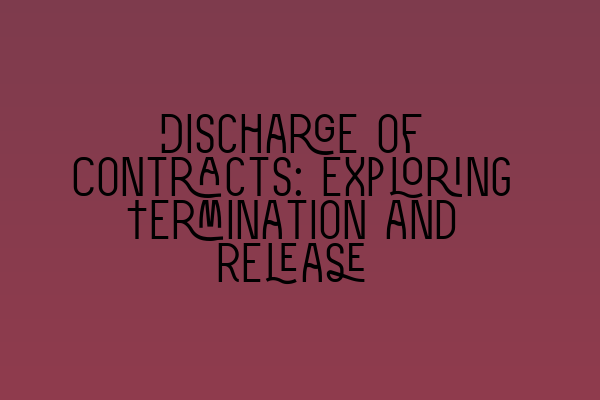Discharge of Contracts: Exploring Termination and Release
In contract law, the discharge of a contract refers to the termination of the contractual obligations that the parties have towards each other. It marks the end of the legal relationship created by the contract. There are various ways in which a contract can be discharged, including performance, agreement, frustration, breach, and operation of law. This article will explore these different methods of discharge and provide insights into the legal implications.
1. Performance
The most common method of discharging a contract is through performance. When both parties fulfill their contractual obligations, the contract is considered to be discharged. This can happen through actual performance, where both parties do exactly what they agreed upon, or through substantial performance, where there may be some minor deviations but the overall purpose of the contract is achieved.
For instance, in the case of a construction contract, if the contractor completes the project according to the agreed-upon specifications and the client pays the agreed-upon amount, the contract is discharged through performance.
For further insights into legal practice and decision-making in contract law, check out our article on Unveiling Real-Life Case Studies: Insights into Legal Practice and Decision-Making.
2. Agreement
Contracts can also be discharged by agreement between the parties. This typically happens through a mutual release or a variation of the contract terms. The mutual release is a formal agreement where both parties agree to discharge each other from the obligations under the contract. On the other hand, a variation of the contract terms occurs when the parties agree to modify the existing obligations or introduce new terms that alter the original agreement.
For example, if two companies have a joint venture agreement but later decide to dissolve the partnership, they can mutually agree to release each other from the obligations and terminate the contract.
To learn more about solicitor salaries in the UK and the factors affecting income, take a look at our article on Exploring Solicitor Salaries in the UK: Average Earnings and Factors Affecting Income.
3. Frustration
When events occur that make it impossible to perform the contract or would fundamentally change the nature of the contractual obligations, the contract can be discharged due to frustration. Frustration is a legal concept that recognizes that unforeseen circumstances may arise, rendering the contract impossible to perform or depriving it of its commercial purpose.
For instance, if a music concert has to be cancelled due to a sudden illness of the performer, the contract between the performer and the event organizer can be discharged due to frustration.
Mastering client relationship management skills as a solicitor is crucial to enhance trust and loyalty. Find helpful tips in our article on Mastering Client Relationship Management: Skills for Solicitors to Enhance Trust and Loyalty.
4. Breach
A contract can be discharged through breach when one party fails to fulfill their obligations under the contract. This can occur through an actual breach, where one party fails to perform as required, or through anticipatory breach, where one party indicates that they will not perform as agreed in the future.
For example, if a buyer fails to make the payment for goods they purchased under a sales contract, the seller can consider the contract discharged due to breach.
Pursuing a law school education in the UK is an important step towards becoming a solicitor. Learn more about choosing the right path for your future in our article on Pursuing a Law School Education in the UK: Choosing the Right Path for Your Future.
5. Operation of Law
In some cases, a contract can be discharged by operation of law. This means that the law intervenes and terminates the contract without the need for any action by the parties. This can occur in situations where the contract becomes illegal, impossible to perform, or if one of the parties dies or becomes legally incapacitated.
For example, if a contract is based on an illegal activity and that illegality is discovered, the contract is discharged by operation of law.
To secure training contracts and embark on the journey to become a solicitor, check out our informative article on Securing Training Contracts: A Roadmap to Becoming a Solicitor.
Conclusion
Understanding the various methods of discharge is essential for anyone involved in contract law. Whether it’s through performance, agreement, frustration, breach, or operation of law, the discharge of contracts marks the end of legal obligations for the parties involved. By familiarizing yourself with these concepts, you can navigate the complex terrain of contract law with confidence and ensure that your legal rights and responsibilities are properly upheld.
